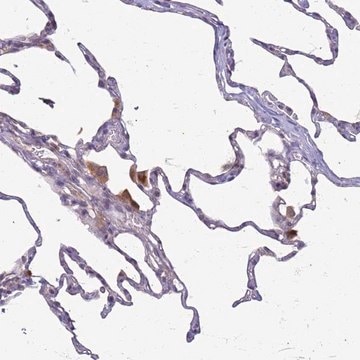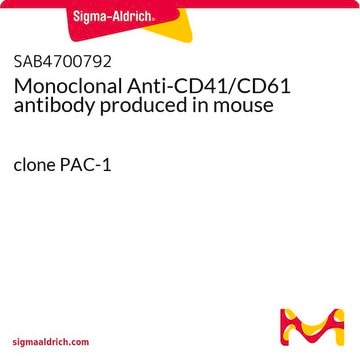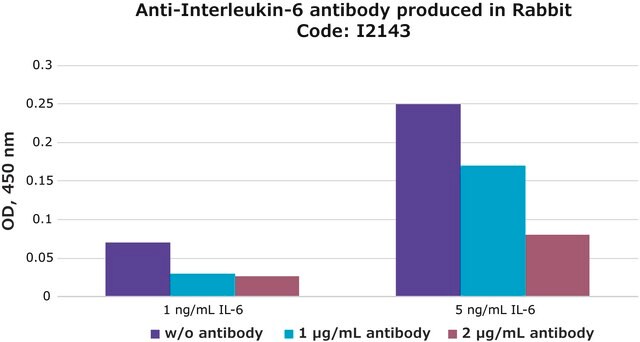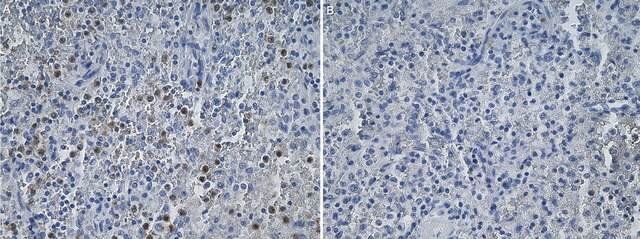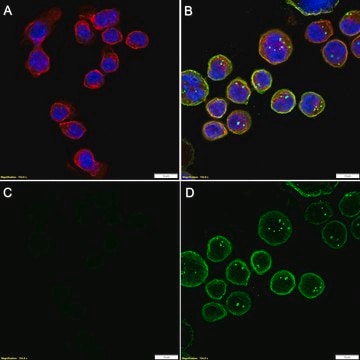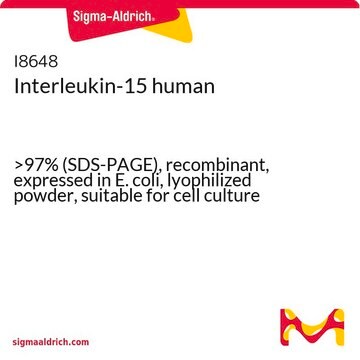HTS187RTA
Ready-to-Assay Ghrelin Receptor Frozen Cells
Human
Sign Into View Organizational & Contract Pricing
All Photos(1)
About This Item
UNSPSC Code:
41106514
eCl@ss:
32011203
NACRES:
NA.84
Recommended Products
Product Name
Ready-to-Assay Ghrelin Receptor Frozen Cells, Human Ghrelin / GHSR-1a / growth hormone secretagogue receptor GPCR frozen cells for Calcium Flux FLIPR Assays.
biological source
human
Quality Level
manufacturer/tradename
Ready-to-Assay
technique(s)
calcium flux assay: suitable
NCBI accession no.
detection method
fluorometric
shipped in
dry ice
General description
Millipore’s Ready-to-Assay GPCR frozen cells are designed for simple, rapid calcium assays with no requirement for intensive cell culturing. Millipore has optimized the freezing conditions to provide cells with high viability and functionality post-thaw. The user simply thaws the cells and resuspends them in media, dispenses cell suspension into assay plates and, following over night recovery, assays for calcium response.
Ghrelin is a 28 amino acid peptide, containing a unique octanoyl moiety added post-translationally to Ser3, with diverse activities in the CNS, gastrointestinal tract, and cardiovascular system (Davenport et al., 2005; Leite-Moreira and Soares, 2007). In the CNS, ghrelin stimulates release of growth hormone from the anterior pituitary and increases appetite by binding to neurons within the arcuate nucleus. Circulating concentrations of ghrelin increase with preprandially and decrease post-prandially, and thus counterbalances the effects of leptin to coordinate energy balance, appetite and food intake. Ghrelin is also expressed in the cardiovascular system where it acts as a potent vasodilator; receptors are up-regulated in patients with atherosclerosis, suggesting that it plays a role in compensating for increased vasoconstriction (Kleinz et al., 2006). The effects of ghrelin are mediated by a Gq-coupled receptor, originally designated GHSR (growth hormone secretogogue receptor), and more recently termed the Ghrelin Receptor or GRLN. Two splice variants have been described; type 1a (GHS-R1a) is the functional receptor, whereas type 1b (GHS-R1b) encodes a truncated, inactive protein with only 5 transmembrane domains. As administration of agonists of the ghrelin receptor to rats leads to increased food intake and antagonists reduce food intake (Beck et al. 2004), antagonism and inverse agonism of the ghrelin receptor may reduce food intake in certain types of obesity, and agonists of the ghrelin receptor are potentially useful for treatment of anorexia and cachexia. Millipore’s cloned human ghrelin-expressing cell line is made in the Chem-1 host, which supports high levels of recombinant ghrelin expression on the cell surface for functional detection via the calcium signaling pathway. Thus, the cell line is an ideal tool for screening for agonists, antagonists and modulators at Ghrelin Receptor.
Ghrelin is a 28 amino acid peptide, containing a unique octanoyl moiety added post-translationally to Ser3, with diverse activities in the CNS, gastrointestinal tract, and cardiovascular system (Davenport et al., 2005; Leite-Moreira and Soares, 2007). In the CNS, ghrelin stimulates release of growth hormone from the anterior pituitary and increases appetite by binding to neurons within the arcuate nucleus. Circulating concentrations of ghrelin increase with preprandially and decrease post-prandially, and thus counterbalances the effects of leptin to coordinate energy balance, appetite and food intake. Ghrelin is also expressed in the cardiovascular system where it acts as a potent vasodilator; receptors are up-regulated in patients with atherosclerosis, suggesting that it plays a role in compensating for increased vasoconstriction (Kleinz et al., 2006). The effects of ghrelin are mediated by a Gq-coupled receptor, originally designated GHSR (growth hormone secretogogue receptor), and more recently termed the Ghrelin Receptor or GRLN. Two splice variants have been described; type 1a (GHS-R1a) is the functional receptor, whereas type 1b (GHS-R1b) encodes a truncated, inactive protein with only 5 transmembrane domains. As administration of agonists of the ghrelin receptor to rats leads to increased food intake and antagonists reduce food intake (Beck et al. 2004), antagonism and inverse agonism of the ghrelin receptor may reduce food intake in certain types of obesity, and agonists of the ghrelin receptor are potentially useful for treatment of anorexia and cachexia. Millipore’s cloned human ghrelin-expressing cell line is made in the Chem-1 host, which supports high levels of recombinant ghrelin expression on the cell surface for functional detection via the calcium signaling pathway. Thus, the cell line is an ideal tool for screening for agonists, antagonists and modulators at Ghrelin Receptor.
Cell Line Description
GPCR Cell Lines
Host cells: Chem-1
Biochem/physiol Actions
GPCR Class: A
Protein Target: Ghrelin / GHSR-1a / growth hormone secretagogue receptor
Target Sub-Family: Ghrelin
Components
Pack contains 2 vials of mycoplasma-free cells, 1 ml per vial.
Fifty (50) mL of Media Component.
Fifty (50) mL of Media Component.
Storage Class Code
10 - Combustible liquids
WGK
WGK 1
Flash Point(F)
Not applicable
Flash Point(C)
Not applicable
Certificates of Analysis (COA)
Search for Certificates of Analysis (COA) by entering the products Lot/Batch Number. Lot and Batch Numbers can be found on a product’s label following the words ‘Lot’ or ‘Batch’.
Already Own This Product?
Find documentation for the products that you have recently purchased in the Document Library.
Our team of scientists has experience in all areas of research including Life Science, Material Science, Chemical Synthesis, Chromatography, Analytical and many others.
Contact Technical Service